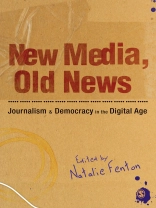Have new communications technologies revitalised the public sphere, or become the commercial tool for an increasingly un-public, undemocratic news media? Are changing journalistic practices damaging the nature of news, or are new media allowing journalists to do more journalism and to engage the public more effectively?
With massive changes in the media environment and its technologies, interrogating the nature of news journalism is one of the most urgent tasks we face in defining the public interest today. The implications are serious, not just for the future of the news, but also for the practice of democracy.
In a thorough empirical investigation of journalistic practices in different news contexts, New Media, Old News explores how technological, economic and social changes have reconfigured news journalism, and the consequences of these transformations for a vibrant democracy in our digital age. The result is a piercing examination of why understanding news journalism matters now more than ever. It is essential reading for students and scholars of journalism and new media.
表中的内容
PART ONE: INTRODUCTION
Drowning or Waving? New media, Journalism and Democracy – Natalie Fenton
PART TWO: NEW MEDIA AND NEWS IN CONTEXT
Technology Foretold – James Curran
The Political Economy of the ′New′ News Environment – Des Freedman
An Ethical Deficit? Accountability, Norms, and the Material Conditions of Contemporary Journalism – Angela Phillips, Nick Couldry, Des Freedman
PART THREE: NEW MEDIA AND NEWS IN PRACTICE
Culture Shock: New Media and Organizational Change in the BBC – Peter Lee-Wright
Old Sources: New Bottles – Angela Phillips
Liberal Dreams and the Internet: A Case Study – James Curran and Tamara Witschge
PART FOUR: NEW MEDIA, NEWS SOURCES, NEW JOURNALISM?
Politics, Journalism and New Media: Virtual Iron Cages in the New Culture of Capitalism – Aeron Davis
New Online News Sources and Writer-Gatherers – Nick Couldry
NGOs, New Media and the Mainstream News: News from Everywhere – Natalie Fenton
PART FIVE: NEW MEDIA, NEWS CONTENT AND INTERNATIONAL CONTEXT
A New News Order? Online News Content Examined – Joanna Redden and Tamara Witschge
Futures of the News: International Considerations and Further Reflections – Rodney Benson
关于作者
Natalie Fenton is a Professor of Media and Communications and Co-Head of the Department of Media, Communications and Cultural Studies at Goldsmiths, University of London. She is also Co-Director of the Centre for the Study of Global Media and Democracy. She has published widely on issues relating to civil society, radical politics, digital media, news and journalism and is particularly interested in issues of political transformation, radical media reform and re-imagining democracy. She was Vice-chair of the Board of Directors of the campaign group Hacked Off for 7 years and is currently Chair of the UK Media Reform Coalition. Her books include New Media: Old News: Journalism and Democracy in the Digital Age (Sage, 2010); Misunderstanding the Internet co-authored with James Curran and Des Freedman (Routledge, 2016); Digital, Political, Radical (2016, Polity); Media, Democracy and Social Change: Re-imagining Political Communications co-authored with Des Freedman, Gholam Khiabany and Aeron Davis (Sage, 2020) and The Media Manifesto co-authored with Lina Des Freedman and Justin Schlosberg and Lina Dencik (Polity, 2020).












